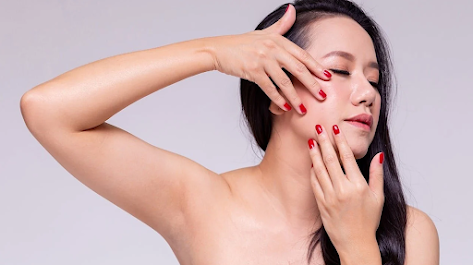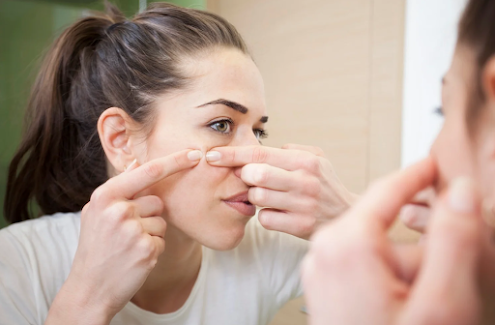14 Ways to Prevent Acne and Lessen Pimples
Anyone who has had acne for a long time can understand how difficult it can be to try to heal your skin. Breaking a seemingly never-ending cycle of breakouts, you can take steps to stop new breakouts in addition to treating the acne you already have.
Although there is no way to cure acne forever, you can reduce breakouts and maintain healthy skin.
Read on for 14 tips on how to prevent acne and get smooth skin.
1. Wash your face properly
Although they can develop elsewhere on the skin, pimples most frequently affect the face. Despite the complexity of the skin microbiome, Propionibacterium acnes is a bacterium that has been found by scientists to be responsible for acne outbreaks. When this bacteria converts sebum — a naturally occurring oil on the skin — into fatty acids, it results in irritation.
Daily removal of sweat, debris and oil helps prevent breakouts; However, over-cleansing the face can aggravate acne.
When excess washing strips away our skin’s natural sebum, it actually causes the skin to produce more oil to balance your skin. Therefore, over-washing your face and using astringents or cleansers that dry your skin too much can aggravate acne.
You should usually wash your face more than twice a day.
Using cleansers that are sulfate-free, fragrance-free, and gentle enough to use twice daily is good for acne. Avoid harsh physical scrubs or drying foaming cleansers.
2. Recognize your skin type
Knowing what products to use and what not to use depends on your skin type. The following factors can be used to determine your skin type; however, if you’re still unclear, you can also seek advice from a dermatologist.
Acne is generally more common in those with oily skin. But pimples can affect everyone. It can be simpler to select an acne treatment plan that clears up your skin if you are aware of your skin type.
Too many products containing active chemicals, such as retinol creams, exfoliating toners, and washes with salicylic acid, might harm your skin’s protective layer and exacerbate outbreaks if you have sensitive, acne-prone skin.
Using a moisturizer designed for dry skin can be excessively occlusive and cause clogged pores if you have oily skin.
3. Use a moisturizer
Moisturizing helps skin stay hydrated, which is very beneficial for skin that is prone to acne. Your skin will generate oil, or sebum, to balance out any dryness if it becomes very dry. Moreover, as was already said, acne can result from too much sebum.
Nevertheless, a lot of moisturizers have chemicals that can irritate your skin and result in pimples, such as oil or artificial smell. When buying a moisturizer, make sure to look at the ingredient list to ensure that it is noncomedogenic and free of fragrance.
Thus, I would like to suggest you a suitable moisturizer to moisturize your skin. It is a trusted skin-friendly moisturizer. Click this link to see what it is. If you like it, buy it.
4. Maintain your hydration
Your body may tell the oil glands in your skin to generate extra oil if you’re dehydrated. In addition to making your skin look lifeless, dehydration also encourages irritation and discolouration.
Make sure you consume eight 8-ounce glasses of water or more a day to keep your body properly hydrated.
Increase your drinking water:
✅following a workout
✅when pregnant or nursing
✅when residing in a warm, muggy climate
5. Apply over-the-counter remedies for acne
OTC acne remedies can aid in the healing of pimples and occasionally even stop them from occurring in the first place.
Please note that excessive use of over-the-counter medications can occasionally result in dryness and irritation, so it’s crucial to adhere to the manufacturer’s usage guidelines.
The following information pertains to the most typical active compounds found in over-the-counter acne treatments:
benzoyl peroxide:
Because benzoyl peroxide destroys acne-causing bacteria, it is most effective for inflammatory acne, such as cysts and red pimples.
acid salicylic:
This component works to cleanse pores and reduce irritation, making it perfect for blackheads and whiteheads.
sulfur:
Naturally occurring and frequently kinder than the other two ingredients listed above is sulfur. Dead skin cells can be dried out to clear clogged pores and absorb extra sebum.
Uncertain about the OTC acne remedy that would be most effective for your skin type or your particular skin objectives? Seeking a dermatologist’s professional advice on your skin could be worthwhile.
A dermatologist can provide professional product recommendations, along with advice on any potential medication interactions to keep in mind. For instance, using a beta hydroxy acid (like salicylic acid) along with retinol can cause excessive dryness and irritation, so you’ll typically want to avoid mixing products with these ingredients.
6. Limit makeup or cosmetics
Although you might be tempted to cover up zits with cosmetics, be aware that doing so could cause breakouts and clog pores.
If you can’t bear to give up makeup entirely, use a noncomedogenic, fragrance-free foundation or concealer to keep your skin from getting any angrier.
Make sure to remove any makeup with gentle suds at the end of the day, especially right before bed.
It never hurts to be cautious about any additional products you use near your face, especially hair styling tools, in addition to limiting cosmetics.
7. Aim to avoid touching your face
You can get germs and other pore-clogging contaminants on your skin by touching your face.
Although it can be difficult to refrain from caressing your face, make an effort to monitor how frequently you do so and attempt to interrupt yourself as much as you can.
8. Avoid popping the pimple
Resisting the pinch of that big white head on the corner of your nose can feel practically impossible, but your best bet is to avoid popping a pimple.
Popped pimples often bleed, but they can make the problem worse by:
✅Skin irritation
✅Inflammatory and surrounding pore blockage
✅Infection and scarring
9. Reduce your time in the sun
While exposure to sunlight can temporarily reduce pimples, it may have long-term negative effects on skin. Regular sun exposure dehydrates the skin, which eventually leads to increased oil production and pore blockage.
All year long, wearing sunscreen can help protect your skin. Of course, sunscreens are typically rather greasy, as you may already be aware. Make sure to use an oil-free, noncomedogenic sunscreen to defend against pimples and the sun.
10. Use tea tree oil
One common home treatment for pimples is the use of tea tree essential oil. Terpinene-4-ol, a substance found in tea tree oil, has been demonstrated to destroy specific bacteria, viruses, and fungus as well as boost white blood cells to aid in healing.
Apply a few drops of tea tree oil to the affected area to treat pimples. A few drops can also be added to your regular moisturizer or cleanser.
11. Use antibiotics
Antibiotics may be prescribed by a dermatologist, and acne treatments may work well to help reduce bacteria and inflammation on your skin. Antibiotics, which come in both topical and oral forms, work by reducing the amount of Propionibacterium acnes bacteria on your skin, which helps break out breakouts.
Antibiotics can cause your body to develop resistance over time, which reduces their efficacy. To get the most out of the recommended therapy, you must adhere to the regimen your dermatologist prescribes. In order to prevent any negative interactions, don’t forget to mention any additional medications you are taking.
12. Avoid following foods
Your diet may also factor into acne.
Some of the common culprits contributing to skin concerns like acne include:
✅processed foods
✅dairy products
✅alcohol
✅refined sugars
You can reduce your intake of these substances or switch to an anti-acne diet. If tapering doesn’t seem to help, try an elimination diet to determine the exact cause of your acne flare-ups.
An elimination diet usually includes a 23-day period of no fast food, dairy, eggs, soy and gluten. Although this may seem harsh, you can start reintroducing these foods into your diet one at a time after 23 days and notice the changes in your skin. You can use this to determine which foods cause acne for you personally.
13. Apply French green clay
French green clay is an absorbent, mineral-rich clay with healing properties. French green clay has powerful antibacterial properties. It helps remove impurities, reduce inflammation and absorb excess oil that can lead to acne.
You can buy French green clay in powder form. You mix this powder with water and make a face mask. You can add other skin-soothing ingredients like yogurt or honey for a more dynamic natural mask.
If you want to buy French green clay, buy it here..
14. Pursue stress-relieving activities
Stress doesn’t cause acne, but it can make it worse. According to the American Academy of Dermatology (AAD), your body produces more oil-stimulating hormones when you’re stressed. It can cause acne.
Some options to help manage stress include:
✅Yoga
✅Meditation
✅Journaling
✅Massage
✅Perfume
✅exercise
Most people get acne from time to time. While they don’t always work, preventative measures can be helpful. Acne can be caused by various factors such as diet, stress, hormones, genetics, etc. Some medications can even cause disease.
However, you have several options for managing and treating acne. Remember that persistence and patience are essential to improving any acne prevention strategy you decide on.

























0 Comments